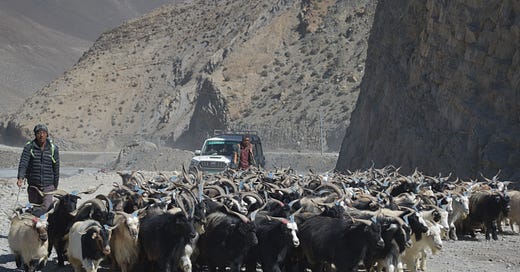You should read (or listen to) Season of the Brown Hyena
These 34 beautiful pages by Wade Davis explore the beauty and necessity of human diversity
Season of the Brown Hyena was originally a lecture given by Wade Davis in his Massey Lectures series for Canadian radio. Later, it was published as the introductory chapter of The Wayfinders, an edited collection of the full lecture series. You can listen to it here on the CBC’s website, read it in The Wayfinders, or find a PDF online (of dubious origin).
Season of the Brown Hyena is a good kind of shortcut. The essay, written by anthropologist and ethnobotanist Wade Davis, offers a profound narrative for grappling with complicated topics. The essay is only 34 pages long and broaches two questions: Why are humans so diverse? and Why is that diversity beautiful?
To answer these questions, Davis looks to the academic field of anthropology. While Season of the Brown Hyena is not an academic text, it is written by an academic and is grounded in academic research1. Fortunately, the essay is not the jumble of ten-dollar words2 you might expect from academic articles. Davis has summarized his research and the research of other scholars into what you might call mass market-anthropology. As a result, Season is a break-neck read. He touches on the entire history of homo sapiens, the field of genetics, the San people of southwest Africa, the death of linguistic diversity, and the dark past of anthropological research all in one essay. And somehow he manages to pull it off.
Anthropology, almost as a rule, is a difficult field to condense. The modern field is predicated on the idea that human culture is infinitely diverse. To anthropologists like Davis, the world we experience is fundamentally shaped by our socio-linguistic surroundings. Where we live, how we’re raised, and how we speak all influence our conceptual understanding of the world. Ideas we in the West might consider monolithic — such as the concept of kinship or the color blue — range widely from culture to culture. Koreans count age differently3, some indigenous Amazonian tribes view time as recorded only by specific events, and the San people, as Davis describes, have never had our same hangups about sex. Humans have an incredibly vast array of ways of being human.
Yet, there is a trap here that anthropology seeks to address. Just because we can learn about any of these practices, doesn’t mean we necessarily understand them conceptually. This is because we are never able to truly embody the socio-linguistic space of another culture. We’re so entrenched in our own way of thinking that we cannot fully adopt the thought patterns and practices of other humans. Our minds have already been baked in the oven of Western European/American thought.
The magic of Wade Davis’ Season of the Brown Hyena is how he addresses this issue with wonderous appreciation. He celebrates that no two cultural frameworks are exactly the same.
The world that I have been fortunate to know, as I hope these lectures will demonstrate, is most assuredly not flat. It is full of peaks and valleys, curious anomalies and divine distractions. History has not stopped, and the processes of cultural change and transformation remain as dynamic today as ever. The world can only appear monochromatic to those who persist in interpreting what they experience through the lens of a single cultural paradigm, their own.
— Wade Davis, Season of the Brown Hyena
The full breadth of human culture is impossibly large. And we, frankly, are terrible at wrestling with that. But Wade Davis’ work is a great place to start. His power as a writer invites us to consider new ways of thinking. He reminds us of things we already know (or think we know) and then synthesizes them at a higher level. Then as a wonderful storyteller, he presents us with a new frame for understanding those same concepts — this time as robust, unique, and fascinating cultural practices deserving of respect.
As Davis would likely attest, reading Season isn’t a complete introduction to anthropology, nor is it robust description of any one culture. I also wouldn’t feel safe qualifying his research as contemporary. Anthropology, like all social sciences seeking clearer truth, has a habit of eating its own4. Still, Season of the Brown Hyena stands as one of the few anthropologically informed texts that anyone can read, enjoy, and put down feeling as if they’ve gained a new appreciation for the world. Bang for your buck, they’re 34 of the best pages you could read today.
Some of Davis’ research has been called into question, especially surrounding his book The Serpent and the Rainbow on Haitian Zombification which I have not read.
A ten-dollar word is just a fancy word.
Marion Lougheed pointed this out in her Medium article about Davis and his 2021 article titled Why anthropology matters.





